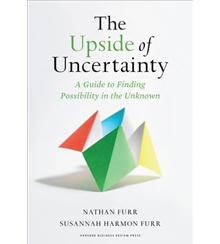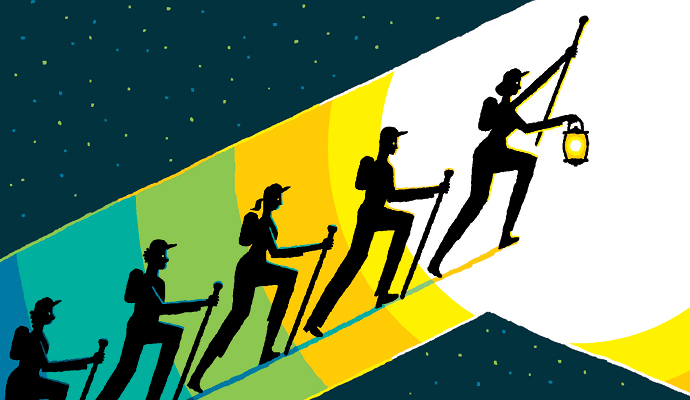Spinning uncertainty into success
A new self-help book gleans lessons from entrepreneurs who saw potential where others saw peril.

The Upside of Uncertainty: A Guide to Finding Possibility in the Unknown
by Nathan Furr and Susannah Harmon Furr, Harvard Business Review Press, 2022
Everywhere you turn, uncertainty seems to be on the rise. Dire climate predictions, unease in the workforce, novel diseases, political and economic volatility. The digitization of everything is monetizing our attention and obliterating stable industries. For the average person, burdened by the weight of uncertainty, negotiating even the smallest of daily decisions has become harder. The simple act of choosing your morning coffee requires sifting through an endless menu of choice. And as for a career? Constantly evolving ways of working make any decision about what technical skills to master and fields to pursue a fraught one. No surprise, then, that recent research points to the increasing need for individuals to not just embrace uncertainty but forge a satisfying life in the face of it.
So argue Nathan and Susannah Harmon Furr in their new book, The Upside of Uncertainty, a clever self-help resource for those of us who need a guiding hand in uncertain times. The husband-wife authors are, respectively, a professor at INSEAD (the France-based international business school) and an entrepreneur, designer, art historian, and self-proclaimed contrarian. Their arguably hopeful and practically helpful guide offers entrepreneurs and B-school students a carefully crafted if overstuffed set of guidelines for a better life.
“Every brilliant insight, choice, act, and innovation comes about only after a phase of uncertainty,” they write. “And the uncertainty brought about by every mistake, setback, discouragement, and even disaster carries possibility within it.” So, hold the phone—you need not flee from this existential challenge of modern life.
The uncertainty brought about by every mistake, setback, discouragement, and even disaster carries possibility within it.”
You can instead follow the Furrs’ four-point model for tackling it head-on: Reframe, Prime, Do, and Sustain. Each of those four actions comes with a set of tools. Reframing tools help you think more creatively about challenges and see potential benefits and opportunities in them. Priming tools help you prepare to act on those opportunities. Doing tools supply you with the traction to unlock their full promise. Finally, sustaining tools “give comfort and remind you why and how to keep going.” These tools can help expand your sense of possibility, essentially giving you permission to consider choices that at first seem impractical. They helped the authors think more practically about moving to Europe, for example, by helping clarify the trade-offs involved in living abroad.
These four pillars anchor 260 pages of a long argument borne out by research dating back to the early 2000s, including interviews with and insights from established thinkers such as Amos Tversky and Daniel Kahneman, Malcolm Gladwell, Adam Grant, Carol Dweck, and Angela Duckworth, and from entrepreneurs like Elon Musk and Jeff Bezos. The Furrs frequently mine Bezos’s well-known decision to scrap a successful career at the D.E. Shaw hedge fund to launch the then-crazy idea of selling books over the internet, a move the authors cite as proof that trusting one’s unproven vision can lead to an unimaginably fulfilling life.
The authors’ relentless optimism underscores an aspirational message. The pages are stuffed with tales of heroic individuals who overcame adversity—make that uncertainty—by thinking counterintuitively and believing in themselves. The authors’ exemplars score venture capital, successfully launch companies, pivot to new careers as award-winning chefs or artists, and, in what seems to be the Furrs’ favorite case study, found a pioneering e-commerce company.
The Upside of Uncertainty delivers helpful takeaways and, perhaps most important, offers anyone struggling with a murky future the courage to persevere. The book also contains useful insights into shifting one’s perspective in tough times, describing entrepreneurial heuristics that can help shrewd thinkers tap into potential opportunity. For example: pressing on when uncertainty emerges, even at the risk of failure; reframing failure as an opportunity for learning and adaptation; exploiting resources and skills at hand instead of investing too deeply in research before experimenting; and thinking entrepreneurially by leveraging existing resources in new ways. They cite the example of Pokémon Go, which was created by a multiplayer-game designer and digital mapping expert who’d helped create what became Google Maps. He realized that Google Maps’ geopositioning technology could be paired with Pokémon characters to form an engaging augmented reality game. Similarly, the founders of Traveling Spoon, a startup that connects food-focused travelers with local home cooks, saw entrepreneurial potential hiding in plain sight when a local woman shared a delicious homemade meal with them in Mexico.
While helpful on a tactical level, the book could benefit from being more concise, as its most important message can get buried under the sheer volume of material. For instance, the abundant examples of successful individuals who have conquered the ravages of uncertainty are meant to inspire, but they ultimately bely the book’s simple premise that embracing uncertainty can lead one to success: how many Bezos wannabes have been crushed by following his example? Indeed, the book rarely reckons with the dark side of uncertainty by showing how to deal with failure, set realistic goals, or learn to accept and love what one already has.
Instead, the authors sell the readers on a narrow vision of success. Think Instagram-worthy images of a holiday in Provence. Their book is a carefully constructed guide to the Best Life, as lived by individuals who confuse more with better, who equate inner spiritual wealth with sipping a glass of crisp white wine at a château. It reads too often like an MBA’s ideal of uber-success.
For some readers, the reverence the book displays for the finer things in life may undermine its core message, but for those who can look past its debatable standards for success, this book can serve as a handy guide to living and working in the modern world.
Author profile:
- Tom Ehrenfeld is a freelance writer and editor based in Cambridge, Mass. Formerly a writer/editor with Inc. magazine and Harvard Business Review, he is also the author of The Startup Garden. He has written extensively about lean enterprise; nine books that he has edited have won the Shingo Publication Award.





